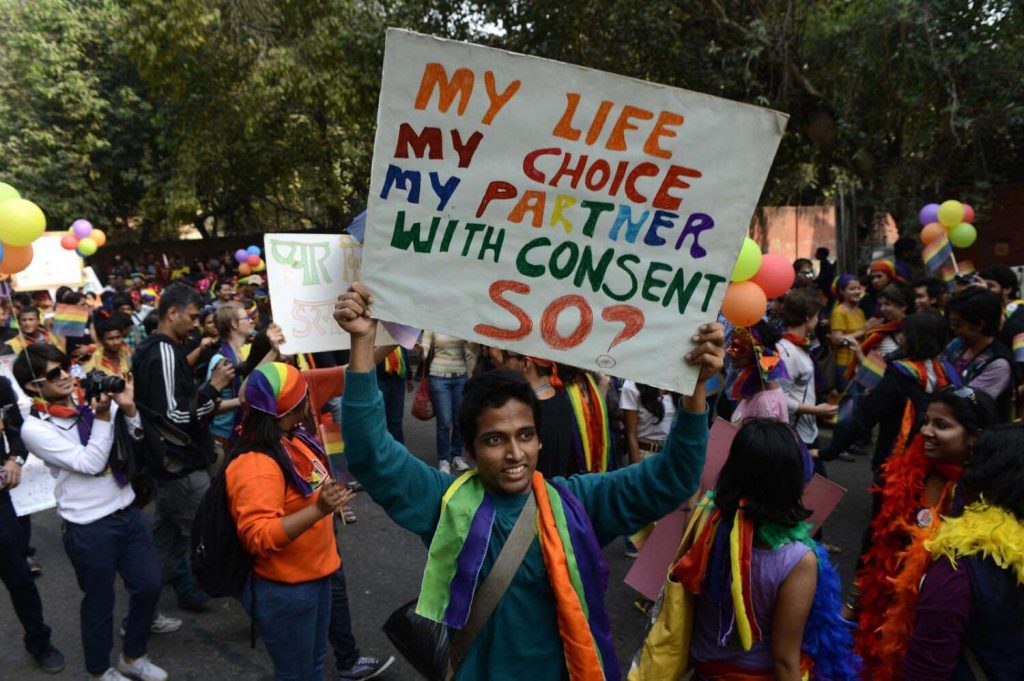If we look around us there is an increasing acceptance of same-sex marriages globally. So, why should gay couples in India be forced to lead lonely lives?
Reena Amos Dyes
“Change is the only constant in life,” said Greek philosopher Heraclitus and truer words were never spoken. But, it is also a fact that it is not always easy to accept change, particularly so where our family systems, religious beliefs, age-old traditions, and societal norms are concerned.
While society accepts technological changes with alacrity because they increase our ease of living, there is a world of resistance to changing habits that take us out of our comfort zone.
To my mind, it is this reluctance to come out of our comfort zone and personal discomfiture with the LGBTQ+ community that is making it difficult for us to accept and sanction same-sex marriages in our country.
We, as a society, seem to be fighting change tooth and nail and are refusing to see the fact that numerous nations have now allowed gay marriages and in 50 countries same-sex couples are also allowed to adopt children.
While many in India view the cause of the human rights of the LGBTQ+ community with sympathy and understanding, but a significant cisgender majority doesn’t. They can’t seem to accept and digest the fact that the LGBTQ+ community, which for centuries has been forced to live on the darker, outer fringes of society, is now standing up and demanding basic human rights. The right to love, the right to marry the person they love and the right to adopt children and complete their family. This fight for the fundamental human need for love and acceptance by a marginalized minority is being seen as chutzpah, impertinence, impudence and insolence by a predominantly cisgender society. Cisgenders are piqued by the courage and pride parades of those who till now were forced to live their lives in suffocating denial of their true selves and a significant majority feel the need to keep these “queers” in check because acceptance of diversity is not easy for everyone.
In fact, it is this fear of change, of altering the status quo that is preventing many nations in conservative Asia from allowing same-sex marriages.
Unfortunately, the brilliant work done by the Supreme Court of India through its historic 2014 verdict granting LGBTQI+ the right to employment and the 2018 judgment de-criminalised gay sex among consenting adults in private, is now being stymied by the Centre which seems to have drawn a line where same-sex marriages are concerned.
In a recent filing in the Supreme Court, the Central Government opposed recognising same-sex marriages and pleaded with the top court to nix pleas by gay couples and activists challenging the existing legal framework.
The Law Ministry argued in the top court that despite the fact that there are various kinds of relationships, legal recognition of marriage is for heterosexual relationships and “Living together as partners and having sexual relationship by same sex individuals … is not comparable with the Indian family unit concept of a husband, a wife and children.”
The court cannot be asked “to change the entire legislative policy of the country deeply embedded in religious and societal norms”, the Law Ministry said in its affidavit. The apex court has now referred the matter to a Constitution Bench of five judges that will hear it on April 18.
One just hopes that the verdict, in the end, comes in favour of same-sex couples, because we, as a nation, must move with the times. If we look around us, slowly and surely there is an increasing acceptance of gay unions globally and their right to live a normal, fulfilling family life with a person of their choice. So, why should gay couples in India be forced to lead lonely lives? Why should they be denied the right to live together in peace under the same roof with the person they love?
Marriage would give them the stability that every relationship requires and help them settle down when the right person comes along. They would be able to rent out homes with ease and inherit the property of their spouse, give approvals in case of medical emergencies, and lead fulfilling lives. They would be able to complete their families by adopting children. In short, the much-needed social sanction and mainstreaming of their relationships would take the stigma and trauma that they have to suffer at present because of our homophobic attitudes, away from their lives.
In its affidavit, the Government has expressed the fear that allowing gay marriages would somehow pose a threat to the “traditional concept of marriage” and goes against “prevailing social values.” According to legal experts, the apex court is clear that in this case the touchstone is constitutional morality, not popular morality and the Centre cannot deny LGBTQI+ their rights to equality and privacy just because this would challenge popular morality.
Even from a social aspect, how does it pose a threat to the “traditional concept of marriage” as your choice of a partner depends on your sexual orientation? Those who are not gay will not turn gay overnight just because the court has allowed same-sex marriages! In fact, it will liberate many gay people who are forced into suffocating marriages because their parents want to see them “settled.” If same-sex marriages are allowed, the parents of gay singles will see that there is social sanction and allow their children to marry a person of their choice instead of forcing them into an unhappy, lifelong union with someone they can never love. The Centre has also said that the Supreme Court cannot be asked “to change the entire legislative policy of the country deeply embedded in religious and societal norms.” But don’t people of different religions get married in our country? Don’t we have a Special Marriage Act for the same purpose? So, tomorrow will we stop all inter-religion marriages or decriminalize them because of our “deeply-embedded religious and societal norms” I think not! Why, because the fundamental rights of heterosexual couples cannot be denied because they are in a majority. But is it fair, that in this day and age, the rights of gay couples can be denied because they are a minuscule minority?
Plus, according to legal experts, same-sex marriages can be recognised under the Special Marriage Act as it already speaks of marriages between “any two persons” which are solemnized under it. Any two persons can also include two persons of the same sex.
Also, societal norms are always changing in an ever-changing world. Aren’t we the same country that has decriminalized adultery and also given legal protection to spouses in live-in relationships? We have also decriminalized gay sex among consenting adults in a private place, so why the hesitancy to give same-sex unions legitimacy?
As I had pointed out earlier in this very column, we Indians are very proud of our ‘sanskriti’ and ‘sanskars’, but why do we pick and choose which part of our ‘sanskriti’ and ‘sanskars’ do we want to be a part of? For all those pointing fingers at LGBTQ+, don’t the Vedas refer to a “third sex,” roughly defined as people for whom sex is not procreative, either through impotence or a lack of desire for the opposite sex? Members of the third sex are not ostracized in the ancient texts and are sometimes recognized for having divine powers or insights.
The world-renowned Kama Sutra, an ancient Indian text, states that same-sex experience is “to be engaged in and enjoyed for its own sake as one of the arts.” And Varuna and Mitra are famously referred to as the “same-sex couple” in the ancient Indian scripture of the Rig Veda.
There are many more such examples of the LGBTQ community being an acceptable part of our society in ancient India. They held their heads high then, so why not now? Are we to learn nothing from our glorious past, the golden India of yesteryears? Sometimes, it is good to go back to our roots and try and understand where we went astray.
Change is coming whether we like it or not. For one, the younger generation is more accepting of diversity than we ever were. Even in middle-aged educated Indians, there is more understanding and acceptance of people who do not conform to the mainstream way of living life.

Significantly and pointing towards increasing acceptance, a statutory body like the Delhi Commission For Protection of Child Rights has moved the Supreme Court in support of petitions seeking validation of same-sex marriages. Seeking intervention in the batch of petitions pending before the top court, the Delhi Commission For Protection of Child Rights (DCPCR) said multiple studies on same-sex parenting have demonstrated that same-sex couples can be good parents.
“The central and state governments should take steps to create public awareness that same-sex family units are as ‘normal’ as heterosexual family units, and specifically that children belonging to the former are not ‘incomplete’ in any way,” the plea said.
Referring to examples of countries that have legalised same-sex marriages, the Commission said at present, more than 50 countries allow same-sex couples to legally adopt children.
“It is respectfully submitted that legislation ought to keep pace with social evolution and the evolution of legal principles. We cannot become frozen in time, nor can we allow mere vocabulary of existing legislation to hinder the realisation of fundamental rights. Legislation is not an end but a means towards achievement of human and fundamental rights,” the plea said.
Even an apex body of psychiatrists in India, Indian Psychiatric Society (IPS) has come out in favour of same-sex marriages and stated that “members of the LGBTQ+ community should be treated like all citizens of the country and have access to marriage, adoption, education, employment, property rights and healthcare.”
“There is no evidence to indicate that the lesbian, gay, bisexual, transgender, queer and asexual (LGBTQA) individuals cannot partake any of the above, and discrimination which prevents the above may lead to mental health issues,” the Gurugram-headquartered organization said in a recent statement.
Surely, these are steps in the right direction and towards inclusivity. The majority heterosexual samaj shouldn’t feel threatened by the aspirations of a minuscule gay minority to get legal sanction for their love, even if the majority doesn’t understand it. The LGBTQ+ community has woken up to its rights and will not be silenced or denied anymore. They will keep on fighting for their right to love, marry and adopt children. Let not history remember us as that generation that was not inclusive enough to embrace diversity. Let us not be afraid of love, heterosexual or gay. Let’s give our ashirwad to same-sex marriages.












